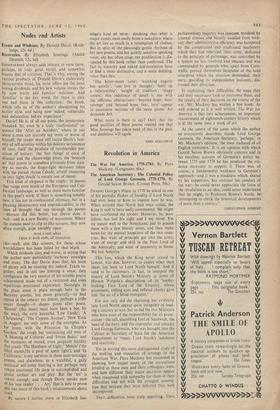Nudes and Artists
IDIOSYNCRASY always adds interest to verse (save, perhaps, to truly great verse), and somewhat lessens that of criticism. That is why, among the various products of Donald Davie's elaborately idiosyncratic mind, his verse offers me the most lasting dividends, and his new volume invites the by now warm and familiar welcome. And 'familiar' is the key word, for there is only one bad piece in this collection: the blurb, Which tells us of the author's abandoning his earlier style, and being now 'naked, vulnerable and defenceless before experience.'
Davie? He is, of all our poets, 'the inveterately unnaked. So, even in a truly 'confessional' se- quence like 'After an Accident,' where in one sense a man can scarcely say more or worse of himself, the reader must still locate Davie's hon- esty of self-scrutiny within his'delicate 'seriousness of tone, itself the produce of invulnerable pre- cision of texture: the 'last things' at once of disaster and the chasm-edge pines, the 'beneath us' that moves in soundless glissando from scen- ery to morals, the finger-light decisions taken with the partial rhyme ('shade, afraid' ensnaring us into 'light, death' is merely one of them).
This kind of elegance is the staple: in poems - that range over much of the European and Cali- fornian landscape, as well as those more familiar in this poet's work. If there is something notably new, it lies not in confessional intirriacy, but in 'a Pleasing idiosyncrasy and unpredictability in the lines of thought that run through the poems --Horace did this better, but Davie does it well—and in a new fluidity of movement. Where the stanzas used to clip to like scissors, they now often enough, gape amiably open: most a unit when Open at both ends, all transition like—well, also like scissors, for those whose Watchfulness has been lulled by that blurb.
Which misleads also, and worse, in saying that the author now particularly 'eschews' nostalgia and irony. The day Davie does that, his horn of plenty will be running dry indeed. Takeh to- gether, and in not too limiting a sense, they configurate the very essence of his notable poetic achievement made out of a restricted and even repetitious emotional experience. Nostalgia in the plain sense is plain enough here in the Barnsley poems; but more generally—to find repose in the soberer yet dearer, perhaps a trifle cosier thought—it shapes poem after poem. 'Hornet' (this insect must have been a bee, by the way); the very beautiful 'Low Lands'; 'A Christening'; 'The Cypress Avenue'; 'New York in August' are only some of the examples. As for irony, with the Proustian 'In Chopin's Garden,' the tough but reminiscing old men of 'A Meeting of Cultures' and 'Jovan Babic,' and the moments of muted, even poignant lucidity that create 'The Hardness of Light,' Metals' ('the Sibyl stands/In a pool of spent light'), and 'In California,' irony survives in these near-nostalgic Poems, and elsewhere, as a watchful, a gaily quizzical self-irony burying a not perhaps very robust emotional life deep in accomplished and genial surface art and play. But the ''are is robust enough; and though Davie speaks now of his 'one reader . . . Art,' that is sure to prove just one more of this book's misstatements about By nature I incline more to Elizabeth Jen-
nings's kind of verse: doubting that what is major comes most easily from a nakedness where' the art lies so much in a resumption of clothes. But in spite of the pleasingly gentle rhythms of her new poems, and her quietly sensitive speaking voice, shy but often crisp, my predilection is dis- sipated by this book rather than confirmed. The fact is, sincerity and naked self-revelation have to find a more distinctive, and a more defining, voice than this.
'The bitter-sweet taste'; 'watching eagerly but. quietly'; 'one lost in thought'; 'built up a relationship'; 'weight of tradition'; 'dingy streets'; this indolence of detail is' one with the officious abstractions—'beyond hope, hate, revenge' and 'beyond hope, fear, love' appear in successive sections of the same poem. Art demands Art. • What more is there to say? Only that the good qualities of these poems remind one that Miss Jennings 'has taken heed of this in the past, and doubtless-Will again.
JOHN..HOLLOWAY


































 Previous page
Previous page